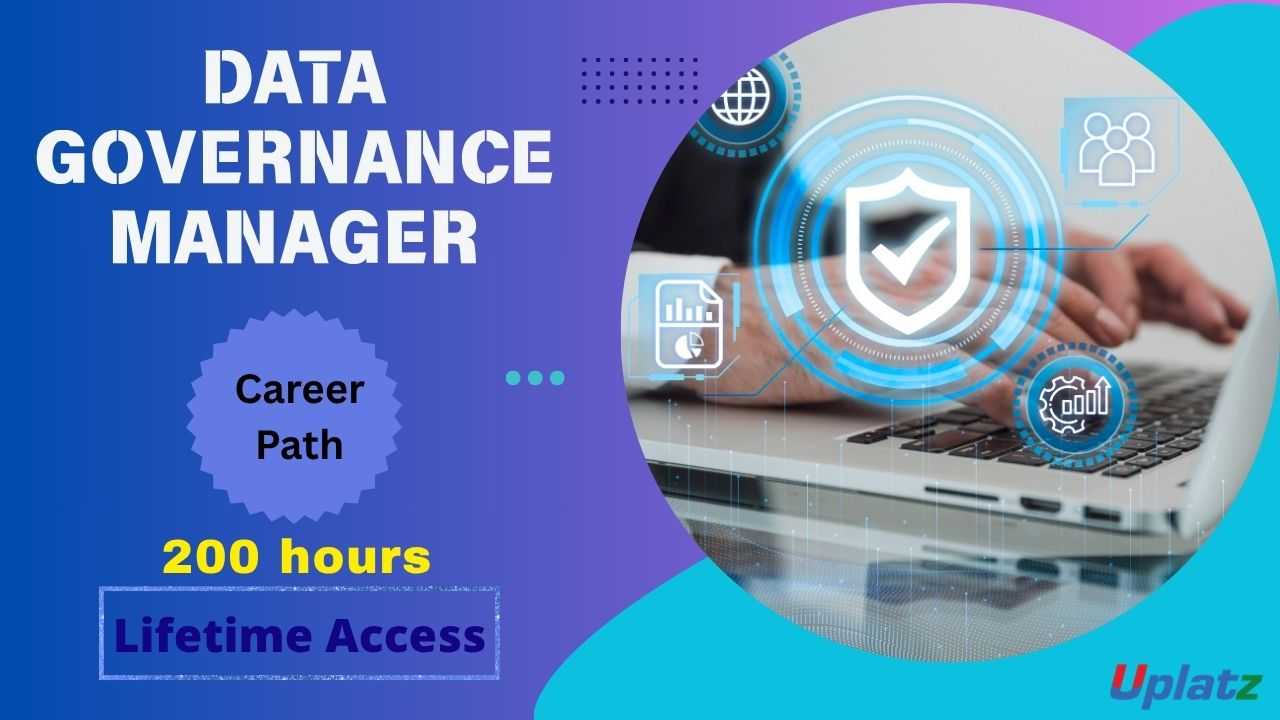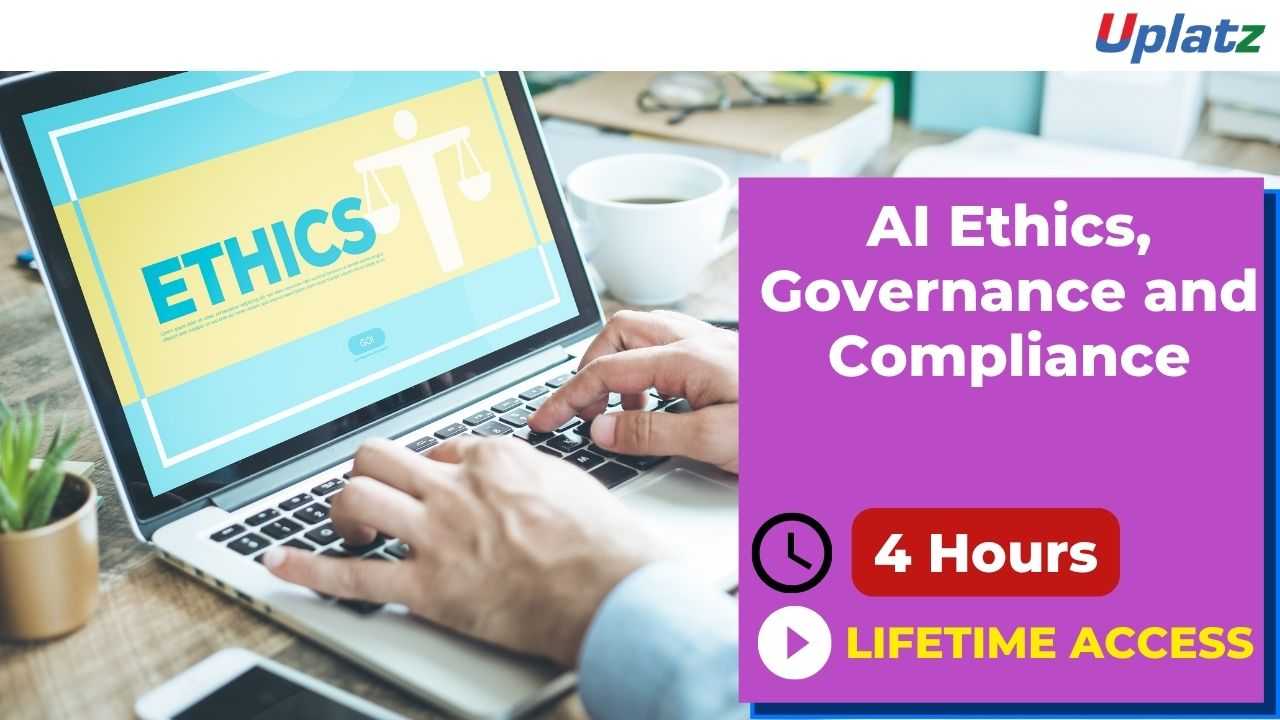Career Path - Data Governance Manager
Lead enterprise data governance, compliance, quality, and strategy with this comprehensive Data Governance Manager career development program. View Course Curriculum
Price Match Guarantee
Full Lifetime Access
Access on any Device
Technical Support
Secure Checkout
Course Completion Certificate
View Course Curriculum
Price Match Guarantee
Full Lifetime Access
Access on any Device
Technical Support
Secure Checkout
Course Completion Certificate
 94% Started a new career
BUY THIS COURSE (
94% Started a new career
BUY THIS COURSE (GBP 32 GBP 99 )-
 85% Got a pay increase and promotion
85% Got a pay increase and promotion
Students also bought -
-

- AI Ethics, Governance, and Compliance
- 4 Hours
- GBP 12
- 2529 Learners
-

- Career Path - Data Strategist
- 250 Hours
- GBP 32
- 1817 Learners
-

- Premium Career Track - Chief Information Officer (CIO)
- 400 Hours
- GBP 39
- 1870 Learners

About the Course – Career Path: Data Governance Manager (Self-Paced Online Course)
As the volume, velocity, and variety of data continue to expand across industries, the importance of managing data as a strategic asset has never been greater. Organizations today recognize that success in the digital economy depends not only on leveraging data, but also on ensuring its quality, compliance, security, and trustworthiness. This is where the role of the Data Governance Manager becomes pivotal.
The Career Path – Data Governance Manager self-paced online course is meticulously designed to help you step confidently into this high-impact leadership role. Whether you are a seasoned data professional, a compliance officer, or someone transitioning into the governance space, this course will provide you with a robust understanding of data governance frameworks, regulatory standards, data stewardship practices, and enterprise-wide governance tools and technologies.
Through high-quality pre-recorded video lectures, tool-based learning, real-life case studies, and strategic frameworks, this course offers a practical, flexible, and comprehensive approach to mastering the art and science of data governance.
What This Course Offers
This course is a gateway to becoming a certified and impactful Data Governance Manager—someone who is trusted to define, implement, and oversee the data policies and procedures that safeguard a company’s most valuable resource: its data.
You’ll start by building a solid foundation in data governance principles, including data ownership, data stewardship, and accountability structures. From there, you’ll dive into the legal and regulatory landscape governing data, such as GDPR, HIPAA, and CCPA, and learn how to design governance strategies that align with these compliance standards.
Further, you’ll explore the intricacies of metadata management, data lineage, data quality control, and master data management (MDM)—all critical components of a strong governance framework. You will also gain insights into deploying governance tools and platforms that support enterprise-wide data management efforts.
Throughout the course, emphasis is placed on cross-functional collaboration. You’ll learn how to coordinate with IT, compliance, security, and business teams to build a culture of data accountability and transparency across departments. You'll come away with not just technical skills, but also the strategic leadership mindset needed to drive enterprise-wide data governance programs.
Who This Course Is For
The self-paced design makes this course suitable for learners at various stages in their careers. You’ll benefit from this course if you are:
- An aspiring Data Governance Manager looking to enter a strategic data leadership role
- A Data Analyst or Data Steward wanting to understand governance at scale
- A Compliance or Risk Management Professional aiming to specialize in data governance frameworks and regulatory adherence
- A Data Architect or IT Professional seeking to expand your scope into governance, privacy, and data ethics
- A Consultant or Project Manager working with clients on data compliance and governance-related projects
Whether your background is technical, operational, or regulatory, this course will help you develop a governance-first approach to data.
Key Skills and Competencies Gained
By completing this course, you’ll be equipped with both the theoretical understanding and practical tools to:
- Establish and operationalize data governance frameworks and policies
- Understand and enforce compliance with global data regulations (GDPR, HIPAA, CCPA, etc.)
- Define and implement data ownership and stewardship roles across the enterprise
- Manage metadata and build data catalogs to improve transparency and traceability
- Create and apply data quality metrics and remediation strategies
- Lead cross-functional teams to promote governance culture and accountability
- Implement data governance platforms and tools like Collibra, Informatica, Alation, or custom-built solutions
- Monitor, audit, and continuously improve governance initiatives to support business objectives
You will emerge with a comprehensive toolkit to handle the challenges and responsibilities that come with the Data Governance Manager role in a modern, data-centric organization.
How to Use This Course Effectively
Being self-paced, this course offers maximum flexibility—but your success depends on how actively you engage with it. Here’s how to use the course to its fullest potential:
1. Define Your Goal from Day One
Begin with clarity about your learning objective. Are you upskilling for a promotion, changing career paths, or preparing for a certification? This goal will guide how you approach each module and keep your motivation high.
2. Set a Personalized Learning Schedule
Create a structured study plan that fits your lifestyle. Block out time each week to go through the video content and revisit previous modules for reinforcement. A recommended pace is 2–3 hours per week, but adjust as needed based on your availability and prior experience.
3. Be an Active Learner
Don’t just watch passively. Take detailed notes, write down key takeaways, and keep a glossary of important governance terms. Pause frequently to reflect on the content, and relate it to real-world scenarios you’ve encountered or read about.
4. Work Through Practical Exercises
Whenever possible, apply the concepts to practice exercises or real-life scenarios. If you work with data in your current role, try implementing parts of a governance framework, or draft a sample data stewardship policy. The more you practice, the better you’ll retain and internalize the knowledge.
5. Explore Tools and Templates
The course may introduce you to industry-standard tools and templates. Download these and experiment with them in your environment. Familiarizing yourself with tools like data dictionaries, RACI matrices, or governance dashboards will prepare you for job responsibilities and interviews alike.
6. Simulate an End-to-End Governance Initiative
As you near the end of the course, create a capstone-style project: define a data governance framework for a fictional organization, map out roles and responsibilities, identify key metrics, and draft a compliance checklist. This will consolidate your learning and also serve as a portfolio piece for job applications.
7. Stay Curious and Keep Exploring
Data governance is a fast-evolving field. Supplement your learning with additional resources like whitepapers, case studies, and regulatory updates. Join professional networks like DAMA International or LinkedIn data governance communities to stay up to date.
8. Revisit Modules as Needed
Some concepts may take time to fully understand—especially if they’re new to you. Don’t hesitate to rewatch modules or re-read supplementary material. This course is yours to access anytime, so use it as a long-term reference guide even after completion.
Launch Your Career as a Data Governance Leader
Data governance is no longer just a regulatory checkbox—it is a strategic priority for any organization that wants to compete in today’s digital-first economy. The Career Path – Data Governance Manager course positions you as a critical enabler of that transformation.
With in-depth knowledge, real-world frameworks, and a practical roadmap to implementation, you’ll be ready to lead data governance programs that deliver trust, transparency, and compliance across your enterprise.
Take charge of your data governance journey—enroll today and transform your career.
Oops! No Video Subscriptions
By the end of this course, learners will be able to:
- Understand data governance frameworks and roles within a governance program
- Define and enforce data policies, data ownership, and stewardship practices
- Implement data quality metrics and improvement strategies
- Ensure regulatory compliance with major data privacy laws (e.g., GDPR, HIPAA)
- Collaborate cross-functionally with legal, IT, analytics, and business units
- Manage metadata, master data, and data lineage documentation
- Apply data governance tools and platforms in enterprise environments
- Prepare for interviews, certifications, and leadership roles in data governance
Syllabus:
- Introduction to Data Governance
- Purpose and importance of data governance
- Roles and responsibilities in governance frameworks
- Data Policies, Standards & Stewardship
- Creating data policies and enforcing standards
- Data ownership and stewardship best practices
- Regulatory Compliance & Legal Frameworks
- Overview of GDPR, HIPAA, CCPA, and other regulations
- Risk management and audit trails
- Data Quality Management
- Measuring data quality and implementing improvement programs
- Tools for cleansing, validation, and quality reporting
- Metadata and Master Data Management (MDM)
- Introduction to metadata repositories
- MDM architecture and implementation
- Data Lineage and Cataloging
- Tracking data origins and transformations
- Implementing enterprise data catalogs
- Governance Tools & Technologies
- Introduction to Collibra, Informatica, Alation, and Microsoft Purview
- Tool selection, configuration, and application
- Cross-Functional Collaboration and Governance Culture
- Working with legal, IT, BI, and compliance teams
- Building a culture of data accountability and literacy
- Data Governance in AI, ML, and Cloud Environments
- Ethical AI governance, explainability, and fairness
- Managing governance across cloud data platforms
- Career Roadmap & Certification Prep
- Resume building and interview preparation
- Guidance for CDMP, DCAM, and other governance certifications
Upon successful completion of this course, learners will receive a Course Completion Certificate from Uplatz, confirming their expertise in data governance strategy, implementation, and compliance management.
This Uplatz certification can greatly enhance your credibility in the data governance domain and support your progression into senior data roles. It validates your ability to develop governance frameworks, lead compliance initiatives, and manage data policies in line with industry best practices.
The course also serves as strong preparation for globally recognized certifications such as CDMP (Certified Data Management Professional) or DCAM (Data Management Capability Assessment Model)—ideal for professionals seeking leadership roles in data governance, risk, and compliance.
The demand for Data Governance Managers is on the rise as organizations seek to protect sensitive information, ensure regulatory compliance, and maintain data integrity in an ever-evolving digital landscape.
Roles after completing this course include:
- Data Governance Manager
- Data Stewardship Lead
- Director of Data Management
- Regulatory Compliance Manager
- Chief Data Officer (CDO) (progression pathway)
Industries actively hiring:
Finance, healthcare, telecommunications, e-commerce, energy, government, and insurance sectors rely on governance experts to manage their data responsibly.
Career Progression:
With experience, learners can move into high-impact leadership roles such as:
- Chief Data Officer (CDO)
- VP of Data Strategy
- Director of Compliance and Risk
- AI Ethics and Governance Lead
- Data Transformation Consultant
Professionals can also transition into advisory or consulting positions, helping organizations implement governance frameworks, privacy programs, and compliance audits across digital and AI initiatives.
1. What is the role of a Data Governance Manager?
A Data Governance Manager defines and enforces data policies, ensures regulatory compliance, and maintains data quality and accountability across the organization.
2. How does data governance differ from data management?
Data governance focuses on policy, accountability, and compliance, while data management involves the day-to-day operations of collecting, storing, and using data.
3. What are the key components of a data governance framework?
Policies, roles, data standards, data stewardship, data quality, compliance controls, and performance metrics.
4. Why is data stewardship important?
It ensures that individuals take ownership of data quality and compliance within their functional areas, promoting responsible data handling.
5. What is metadata and why is it crucial for governance?
Metadata describes data characteristics and lineage, helping organizations track data origins, transformations, and usage.
6. How do you ensure data quality in a governance program?
By defining data quality metrics, conducting audits, establishing ownership, and leveraging tools for validation and cleansing.
7. Which tools are commonly used in data governance?
Popular tools include Collibra, Informatica, Alation, Talend Data Catalog, and Microsoft Purview.
8. What is GDPR and how does it affect data governance?
GDPR is a data privacy regulation that mandates strict controls on personal data handling; compliance is a key goal of governance frameworks.
9. How does data governance support AI and machine learning initiatives?
It ensures the training data is accurate, unbiased, and traceable, supporting ethical and reliable AI deployment.
10. What challenges might a Data Governance Manager face?
Resistance to change, data silos, lack of ownership, unclear roles, and integrating governance into fast-paced digital environments.









